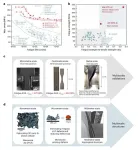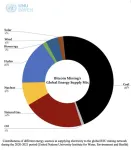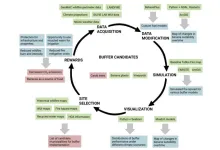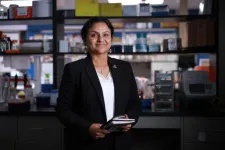The research, led by Drs. Trevor Pugh and Raymond Kim at Princess Margaret Cancer Centre, UHN and OICR and Dr. David Malkin at SickKids, has been published in Cancer Discovery. The study, which was funded primarily by The Terry Fox Research Institute, would not have been possible without the generosity of the patients who participated.
Li-Fraumeni syndrome is an inherited condition associated with a very high risk of developing cancer—often tumours affecting the breast, soft tissue, brain and other organs. It is caused by changes in the TP53 gene, which encodes a protein that helps to prevent tumour formation and is commonly termed the ‘guardian of the genome.’
Cancerous cells and healthy cells release pieces of DNA into the blood. By analyzing these DNA fragments, researchers are developing methods to detect whether a tumour has developed in the body. Testing blood samples for signs of cancer – often called liquid biopsies - is an attractive screening approach compared to imaging methods, which require specialized machines, and biopsies, which are more invasive.
The research team analyzed 170 blood samples from 82 individuals with Li-Fraumeni syndrome collected over several years, as well as 30 blood samples from individuals without Li-Fraumeni syndrome, providing a proof-of-principle framework that may support the detection of specific cancers earlier for individuals with Li-Fraumeni syndrome.
For Luana Locke and her family, early detection is invaluable and has prolonged her life many times already. Luana was diagnosed with breast cancer at age 25 and later discovered that her mother, children and many members of her extended family carried the same TP53 genetic change.
Luana, who has since had sarcoma, lung cancer, thyroid cancer and skin cancer, and her children have regular screenings, blood tests, MRIs of the entire body, and ultrasounds at Princess Margaret Cancer Centre and SickKids, to detect cancers early. After years of these scans Luana’s daughter, Juliet, was diagnosed with leukemia at age 14, a condition they have since learned may have been detected months earlier with this new blood sample analysis.
“Even though I have LFS, I never really felt cancer anxiety until after I was diagnosed,” says Juliet. “While my check-ups are reassuring, getting more precise diagnoses earlier is the next level in care.”
Dr. Malkin been monitoring Luana’s children for almost 20 years, including her son who was one of the first people to follow a cancer surveillance protocol known as the ‘Toronto Protocol’, while Dr. Kim has been monitoring Luana for almost 10 years.
“This is a full circle moment for us. From being part of the first Toronto Protocol to what may now be the next step in early detection and diagnosis for families with LFS, our family has relied on the advancements made at SickKids and The Princess Margaret,” says Luana. “Regular scans and check-ups are routine when you have LFS, but the ability to predict when and where cancers develop rather than react when one has already developed would be life changing.”
The team will conduct a clinical trial to further test this approach and screen patients in the hope of finding their cancer earlier. These patients will include those with different types of high-risk cancer predisposition syndromes, including Li-Fraumeni syndrome, Lynch Syndrome, and Hereditary Breast and Ovarian Cancer; all of which are brought under a nation-wide research consortium that Drs. Pugh and Kim founded in 2017.
This work was supported by the Terry Fox Research Institute and Terry Fox Foundation, Canadian Institutes for Health Research, TD Ready Challenge, the McLaughlin Centre at the University of Toronto, Shar Foundation, FDC Foundation, Bhalwani Family Charitable Foundation, Karen Green and George Fischer Genomics and Genetics Fund, Lindy Green Family Foundation, The Devine/Sucharda Charitable Foundation, SickKids Foundation, The Garron Family Cancer Centre, The Princess Margaret Cancer Foundation and the Ontario Institute for Cancer Research. This work would not have been possible without the generosity of the patients who participated in this study.
###
Notes to Editors
Quotes
“Until now, we really didn’t have good ways of doing surveillance in children with cancer or in children with cancer predisposition. Now, we can use a simple blood test to identify when, where and if a cancer is occurring. That is precision,” says Dr. David Malkin, Staff Oncologist, Senior Scientist and Director of the Cancer Genetics Program at The Hospital for Sick Children (SickKids) and a Professor of Paediatrics and Medical Biophysics at the University of Toronto. “These promising findings can be extended to all hereditary cancer syndromes to help improve the accuracy of cancer detection, especially for common tumour types, utilizing several analysis types that leverage different biological measurements.”
“We used a combination of genomic, fragmentomic and epigenetic methods to analyze patients’ blood samples at a molecular level,” says Dr. Trevor Pugh, Senior Scientist at Princess Margaret Cancer Centre and Director of the Ontario Institute for Cancer Research (OICR) Genomics Program, where blood samples were analyzed. “The key to these long, multi-year studies is keeping up the momentum and building infrastructure to enable comparisons of multiple types of data over time. Here, we were able to detect multiple different types of DNA changes in blood that were a telltale sign that cancer was developing somewhere in the body months before cancer would show up in imaging.”
“Each of these methods were able to detect cancer-associated signals in the samples, but the integration of multiple analyses provides a more holistic view of tumour DNA events. This more robust approach is paramount in early cancer detection where the stakes are high.” says Dr. Raymond Kim, Medical Director of Cancer Early Detection at the Princess Margaret Cancer Centre’s Bhalwani Familial Cancer Clinic and lead of the Ontario Hereditary Cancer Research Network at OICR. “To improve the accuracy of early stage cancer diagnoses, such genetic tests can be used to complement other clinical screening methods, and they can be performed at a higher frequency.”
For more information, or to speak to the researchers involved, please contact:
Marina Jimenez
Communications Director, Princess Margaret Cancer Centre
Email: marina.jimenez@uhn.ca
Sarah Warr
Senior Communications Advisor, The Hospital for Sick Children (SickKids)
Email: sarah.warr@sickkids.ca
END





